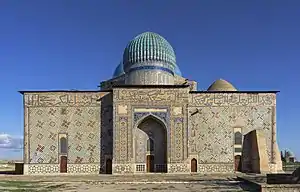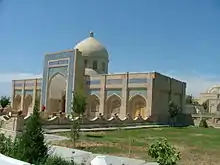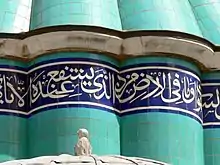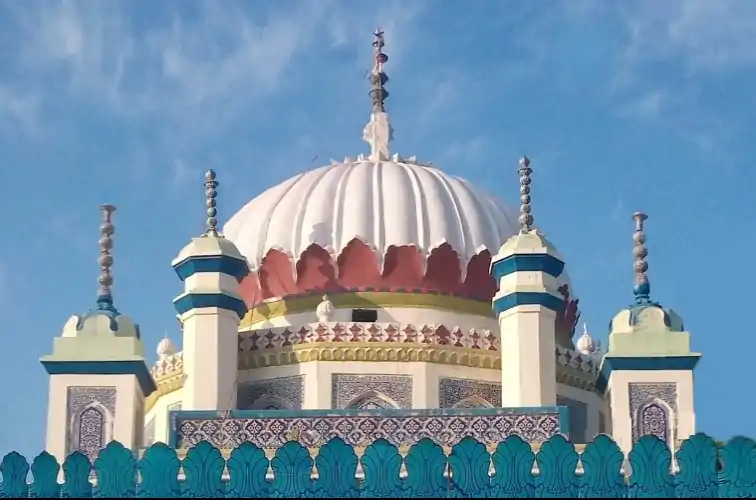List of Sufi saints
Sufi saints or Wali (Arabic: ولي, plural ʾawliyāʾ أولياء) played an instrumental role in spreading Islam throughout the world.[1] In the traditional Islamic view, a saint is portrayed as someone "marked by [special] divine favor ... [and] holiness", and who is specifically "chosen by God and endowed with exceptional gifts, such as the ability to work miracles."[2]
| Part of a series on Islam Sufism |
|---|
|
|

The mausoleum of Ahmad Yasawi who was also considered a Sufi saint and poet in Turkistan, current day Kazakhstan.
List

Mosque and shrine of Sayyid Baha ud-Din Naqshband Bukhari in Bukhara, Uzbekistan. After whom the Naqshbandi Golden Chain is named after.

Quranic calligraphy inscribed on the walls of the famous 12th century Islamic saint, scholar, jurist and theologian Jalal ad-Din Rumi in Konya, Turkey.

Mosque and shrine of Imam Al-Mursi Abu'l-'Abbas, in ميدان المساجد، الجمرك، Qesm Al Gomrok, Alexandria Governorate, Egypt.

Shrine of Pir Hadi Hassan Bux Shah Jilani,Duthro Sharif,Sanghar,Sindhi,Pakistan
A
- Abul Hasan ash-Shadhili
- Ameer Muhammad Akram Awan (1934-2017, lived, did coal mining business nearby, preached, gave spirtual training and buried at Dar ul Irfan Munara, Pakistan, was the 12th Sheikh of Silsila Naqshbandia Owaisiah and writer of several books and 03 Tafaseer of the Holy Qur'an)
- Abdallah ibn Alawi al-Haddad (1634-1720, buried in Hadhramaut, author on several books on Dhikr)
- Abdullah Shah Ghazi (d. 720, buried in Karachi)
- Abdul Waahid Bin Zaid (d. 711, buried in Iraq)
- Abdul Khaliq Ghajadwani (d. 1179, buried in Bukhara, one of the Khwajagan of the Naqshbandi order)
- Abdul Qadir Gilani (1077–1166, buried in Baghdad, founder of the Qadiriyya Sufi order)[3][4]
- Abdul Razzaq Gilani (1134-1207, buried in Baghdad, son of Abdul Qadir Gilani, promoted the Qadiriyya order)
- Abu Ishaq Shami (d. 940, buried on Mount Qasioun, founder of the Chishti Order)
- Abū-Sa'īd Abul-Khayr (967-1049, buried in Miana, Turkmenistan, poet who innovated the use of love poetry to express mystic concepts)
- Abu al-Abbas al-Mursi (1219-1287, buried in Anfoushi, one of the four master saints of Egypt)
- Abul Hasan Hankari (1018-1093, buried in Baghdad, noted scholar and miracle worker)
- Adam Khaki (14th century, buried in Badarpur, Assam, took part in the Conquest of Sylhet and preached at Badarpur)
- Afaq Khoja (1626-1694, buried in Xinjiang, opposed the Chagatai Khanate's attempt to enforce Yassa law on Muslims)
- Ahamed Muhyudheen Noorishah Jeelani (1915-1990, buried in Bandlaguda Jagir)
- Ahmed Raza Khan Barelvi (1856-1921, buried in the Bareilly Sharif Dargah, reformer in British India)
- Ahmad Ghazali (1061 to 1123 or 1126, buried in Qazvin, younger brother of the more famous Al-Ghazali, reasoned that as God is absolute beauty, to adore any object of beauty is to participate in a divine act of love)
- Ahmad al-Tijani (1737–1815, buried in Fez, Morocco), founder of the Tijaniyyah order)
- Ahmadou Bamba (1853–1927, buried next to the Great Mosque of Touba, lead a pacifist struggle against the French colonial empire)
- Ahmad Yasawi (1093-1166, buried in the Mausoleum of Khoja Ahmed Yasawi, poet, founder of Turkish Sufism)
- Akshamsaddin (1389-1459, buried in Göynük, tutor and advisor to Mehmed the Conqueror)
- Akhundzada Saif-ur-Rahman Mubarak (1925–2010, buried in Lahore, founder of the Saifia Sufi order)
- Al-Busiri (1211–1294, buried in Alexandria, poet, author of the Qasida Burda)
- Wasif Ali Wasif (1929-1993, buried in Lahore, was a teacher, writer, poet, and Sufi saint from Pakistan)
- Habib al-Ajami (d. 738, buried in Basra)
- Abu Bakr al-Aydarus (1447–1508, buried in Aden, the patron saint of Aden, credited with introducing Qadiri Sufism to Ethiopia and coffee to the Arab world)
- Ahmad al-Badawi (1200-1276, buried in Ahmad Al-Badawi Mosque, most popular saint in Egypt)
- Al-Ghazālī (1058-1111, buried in Tus, Iran, considered a Mujaddid, author of The Revival of the Religious Sciences and The Incoherence of the Philosophers, influenced early modern European criticism of Aristotelian physics)
- Al-Hallaj (858-922, ashes scattered in the Tigris, imprisoned and executed after requesting "O Muslims, save me from God" and declaring "I am the Truth")
- Ali Hujwiri (1009-1072/77, buried in Lahore, author of Kashf ul Mahjoob, spread Sufism throughout India)[5]
- Ali-Shir Nava'i (1441-1501, buried in Herat, author of Muhakamat al-Lughatayn and founder of Turkic literature)
- Abu al-Hassan al-Kharaqani (963-1033, illiterate mystic who influenced Avicenna, Rumi, and Jami)
- Al-Qushayri (986-1072, buried in Nishapur, author who distinguished four layers of Quranic interpretation and defended the historical lineage of Sufism)
- Alauddin Sabir Kaliyari (1196–1291, buried near Haridwar, founder of the Sabiriya branch of the Chishti order)[6]
- Amir Khusrau (1253–1325, buried in the Nizamuddin Dargah, influential musician, considered the "father of Urdu literature")[7]
- Amir Kulal (1278-1370, buried near Bukhara, taught Timur and Baha' al-Din Naqshband)
- Attar of Nishapur (1145-1221, buried in the Mausoleum of Attar of Nishapur, author of The Conference of the Birds and the hagiographic Tazkirat al-Awliya)
- Azan Faqir (17th century, buried in Sivasagar near the Brahmaputra River, reformer who stabilized Islam in the Assam region)[8]
- Abd al-Karīm al-Jīlī (1365-1424, expounded on the works of Ibn Arabi)
- Abu Al Fazal Abdul Wahid Yemeni Tamimi
- Abdul Aziz bin Hars bin Asad Yemeni Tamimi
- Abu al-Najib Suhrawardi
- Abu Bakr Shibli
- Ahmad Zarruq
- Abdul Qadeer Siddiqui Hasrat
B
- Baba Fakruddin (1169–1295, buried in Penukonda)[9]
- Baba Kuhi of Shiraz (948-1037)
- Baba Shadi Shaheed (17th century, first Chib Rajput to convert to Islam, married a daughter of Babur)
- Sheikh Bedreddin (1359–1420, buried in Istanbul in 1961, revolted against Mehmed I)
- Baha' al-Din Naqshband (1318–1389, buried in Bukhara, founder of the Naqshbandi order)
- Balım Sultan (d. 1517/1519, buried in Nevşehir Province, co-founder of the Bektashi Order)
- Bahauddin Zakariya (1170–1267, buried in the Shrine of Bahauddin Zakariya, spread the Suhrawardiyya order through South Asia)[10]
- Bande Nawaz (1321–1422, buried in Gulbarga, spread the Chishti Order to southern India)[11]
- Khwaja Baqi Billah (1564–1605, buried in Delhi, spread the Naqshbandi order into India)[12]
- Bawa Muhaiyaddeen (b. 1986, founder of the Bawa Muhaiyaddeen Fellowship in Philadelphia)
- Bayazid Bastami (874/5-848/9, buried in Shrine of Bayazid Bostami, noted for his ideas on spiritual intoxication)
- Bibi Jamal Khatun (d. 1639 or 1647, lived in Sehwan Sharif, sister of Mian Mir)[13]
- Bodla Bahar (1238-1298, buried in Sehwan Sharif, features in the miracle stories of Lal Shahbaz Qalandar)
- Bu Ali Shah Qalandar (1209–1324, buried in Panipat)[14]
- Bulleh Shah (1680–1757, buried in Kasur, regarded as "the father of Punjabi enlightenment")
D
- Dara Shikoh (1615–1659, brother of Aurangzeb, author of Majma-ul-Bahrain)[15]
- Daud Bandagi Kirmani (1513–1575, buried in Shergarh, Punjab)[16]
- Dawūd al-Qayṣarī
- Dawud Tai (d. circa 777-782)
- Dhul-Nun al-Misri
F
- Fakhr ad-Din ar-Razi
- Fariduddin Ganjshakar (1188–1280, buried in the Shrine of Baba Farid, developed Punjabi literature through poetry)[17]
- Fuzûlî (1494–1556, considered one of the greatest poets of Azerbaijani literature)
G
- Ghulam Ali Dehlavi (1743–1824, buried in Delhi)
- Ghousi Shah (1893–1954, buried in Hyderabad)
- Gül Baba (d. 1541, buried in Tomb of Gül Baba, esoteric author and patron saint of Budapest)
H
- Hafez (1315-1390, buried in Tomb of Hafez, highly popular antinomian Persian poet whose works are regularly quoted and even used for divination)
- Haji Huud (1025–1141, buried in Patan, Gujarat, helped spread Islam in India)[18]
- Hacı Bayram-ı Veli (1352–1430, buried in Ankara, founder of the Bayramiye order)
- Haji Bektash Veli (1209–1271, buried in the Haji Bektash Veli Complex, revered by both Alevis and Bektashis)
- Hasan al-Basri (642-728, buried in Az Zubayr, highly important figure in the development of Sunni Sufism)
- Hazrat Babajan (d. 1931, buried in Pune, master to Meher Baba)
- Yusuf Hamdani (1062-1141, buried in Merv)
- Mir Sayyid Ali Hamadani (1314–1384, buried in Khatlon Region, spread the Kubrawiya order throughout Asia)[19]
- Hüsn ü Aşk
I
- Ibrahim al-Dasuqi (1255–1296, buried in Desouk, founder of the Desouki order)
- İbrahim Hakkı Erzurumi (1703–1780, buried in Tillo, astronomer and encyclopedist, first Muslim author to cover post-Copernican astronomy)
- Ibrahim ibn Faïd (1396-1453)
- Imadaddin Nasimi
- Ismail Haqqi Bursevi (1653-1725, buried in Bursa, author noted for esoteric interpretations of the Quran)
- Ismail Qureshi al Hashmi (1260–1349)
J
- Jalaluddin Surkh-Posh Bukhari (1192–1291)[20]
- Jamal-ud-Din Hansvi
K
- Khwaja Abdullah Ansari
- Khwaja Ghulam Farid (1845–1901, buried in Mithankot, poet)
- Kodinar (kodinar gujarat .He is grandson of gous-e-azam dastagir. Urs of rizkullah shah dada is on 1 to 10 dates of rabi'al-akhir . He got title of khawaja-e-qadri and choti Baghdad)
- Arabati Baba Teḱe
- Usman Harooni
- Ali Hujwiri
- Iraqī (1213–1289)[21]
- Ibrahim Niass
- Ibn Adham
- Ibn Arabi
- Ibn Ata Allah
- Imam Fassi
- Jabir ibn Hayyan
- Ja'far al-Sadiq
- Jahanara Begum Sahib (1614–1681)[15]
- Jahaniyan Jahangasht (1308–1384)
- Jamī
M
- Madurai Maqbara
- Mirza Mazhar Jan-e-Janaan (1699–1781)
- Muhammad Jaunpuri
- Muhammad al-Jazuli
- Syed Abdul Rehman Jilani Dehlvi (1024-1088)
- Abdul Karim Jili
- Junayd of Baghdad
- Khâlid-i Baghdâdî
- Qutbuddin Bakhtiar Kaki
- Alauddin Sabir Kaliyari
- Maruf Karkhi
- Khan Jahan Ali (d. 1459)
- Lal Shahbaz Qalander (1177–1274)[22]
- Machiliwale Shah
- Magtymguly Pyragy
- Noor Muhammad Maharvi (1730–1791)
- Mahmoodullah Shah
- Mahmud Hudayi
- Madurai Maqbara
- Mir Amjad Ibrahim Ash Shadhili
- Meher Ali Shah
- Mian Mir (1550–1635)[23]
- Mian Muhammad Bakhsh
- Sayyid Ali Hamadani
- Muhammad Suleman Taunsvi
- Mohammad Tartusi
- Mubarak Makhzoomi (1013-1119)[24]
- Muhammad Al-Makki
- Muhammad ibn Tayfour Sajawandi
- Muhammad Ilyas Attar Qadri
- Muqaddam
- Muhammad Qadiri (1552-1654)
- Mustafa Gaibi
- Makhdoom Ali Mahimi (1372–1431)[25]
- Mohamed ben Issa (1467–1526, buried in Meknes, founder of the Aissawa order)
- Moinuddin Chishti (1141–1230, buried in the Ajmer Sharif Dargah, spread the Chishti order throughout India)[26]
- Muhammad ibn `Ali at-Tirmidhi
N
- Nadir Ali Shah
- Nāimī
- Najm al-Din Razi
- Nājm ūd-Dīn Kubrā
- Nazim Al-Haqqani
- Nasir Khusraw
- Nasreddin
- Nathar Vali
- Shah Niamatullah
- Shah Nimatullah Wali
- Nizamuddin Auliya
- Nasiruddin Chiragh Dehlavi
- Syed Nooran Shah(Haji Baba)[27]
- Nizamuddin Auliya (1238–1325)[28]
P
- Pir Baba (1431-1502)[29]
- Pir Sultan
- Pir Yemeni
Q
R
- Rabbānī (ca. 1564-1624)[31]
- Rabia Basri
- Rahman Baba
- Rifa'ī
- Rukn-e-Alam (1251–1335)[32]
- Rumi
S
- Saadī
- Sabakhī
- Sachal Sarmast (1739-1827)
- Shah Maroof Khushabi
- Shah Sulaimān Nūri (1508-1604)
- Sidi Boushaki
- Sahl al-Tustari
- Salim Chishti (1478–1572)[33]
- Salman al-Farisī
- Sanai
- Syed Ahmad Sultan (12th-century)
- Sarı Saltuk
- Sarmad Kashani (d. 1661)[34]
- Saint Nurī
- Semnanī (1308–1405)[35]
- Shah Abdul Latif Bhittai (1689-1752)
- Shah Badakhshi (1584–1661)[36]
- Sayed Badiuddin
- Shah Gardez (1026–1152)[37]
- Shah Hussain (1538–1599)[38]
- Shah Jalal (1271–1347)[39]
- Shah Mustafa (d. 1336)
- Shah Jalal Dakhini (d. 1476)
- Shah Amanat (d. 1809)
- Shah Paran (14th century)[40]
- Shamas Faqir
- Shāms-i Tabrizī
- Sheikh Edebali
- Shah Syed Muhammad Nurbakhsh Qahistani
- Syed Ahmad Ullah (1826-1906)
- Soch Kraal
- Sufi Barkat Ali
- Shahab al-Din Abu Hafs Umar Suhrawardi
- Shahāb al-Dīn al-Maqtul
- Sharfuddin Shah Wilayat (1255-1346)
- Shaykh Syed Mir Mirak Andrabi ( 921A.H - 990 A.H)
- Sirri Saqti
- Sultan Bahu (1628–1691)
- Sultan Walad
- Syed Yaqub
- Shah Farid-ud-Din Baghdadi (c. 1551 AD – c. 1733 AD)
- Sadr al-Din al-Qunawi
- Safi-ad-din Ardabili
- Shah Abdul Latif Bhittai (1689–1752, buried in the Shrine of Shah Abdul Latif Bhittai, considered the greatest Muslim poet of the Sindhi language)
- Shah Waliullah Dehlawi (1703–1762, buried in Munhadiyan, author noted for anti-Shia and anti-Hindu works)
Y
- Yahya bey Dukagjini
- Yahya Efendi
- Yahya Maneri (1263–1381)[41]
- Yunus Ali Enayetpuri (R.)
- Yunus Emre
- Youza Asouph
See also
References
- Schimmel, Annemarie (1975). Mystical Dimensions of Islam. Chapel Hill: University of North Carolina Press. p. 346. ISBN 0-8078-1271-4.
- Radtke, B., "Saint", in: Encyclopaedia of the Qurʾān, General Editor: Jane Dammen McAuliffe, Georgetown University, Washington, D.C..
- Biographical encyclopaedia of Sufis: Central Asia and Middle East by N. Hanif, 2002, p. 123.
- The Sultan of the saints: mystical life and teaching of Shaikh Syed Abdul Qadir Jilani, Muhammad Riyāz Qādrī, 2000, p. 24.
- Pnina Werbner (2003). Pilgrims of Love: The Anthropology of a Global Sufi Cult. C. Hurst & Co. p. 4.
- Dr. Harbhajan Singh (2002). Sheikh Farid. Hindi Pocket Books. p. 11. ISBN 81-216-0255-6.
- E.G. Browne (1998). Literary History of Persia.
- The Brahmaputra Beckons. Brahmaputra Beckons Publication Committee. 1982. p. 39. Retrieved 2008-09-05.
- Jagadish Narayan Sarkar. Thoughts on Trends of Cultural Contacts in Medieval India. p. 41.
- ZH Sharib (2006). The Sufi saints of the Indian subcontinent. Munshirm Manoharlal Pub Pvt Ltd.
- Urs-e-Sharief of Khwaja Bande Nawaz in Gulbarga from tomorrow Archived 2008-06-12 at the Wayback Machine "The Hindu", Nov 27, 2007.
- "Article on KhwajaBaqi Billah". Archived from the original on 2010-06-27. Retrieved 2009-11-15.
- Ernst, Carl W. (1997). The Shambhala Guide to Sufism. Boston: Shambhala. p. 67. ISBN 978-1570621802.
- "Dargah of Bu-Ali-Shah-Qalandar". Archived from the original on 2010-03-14. Retrieved 2009-11-08.
- Schimmel, Annemarie (1997). My Soul Is a Woman: The Feminine in Islam. New York: Continuum. p. 50. ISBN 0-8264-1014-6.
- Muntakhab-ut-Tawarikh’, Vol II and III, by Abdul Qadir bin Mulik Shah Al-Badaoni (Translated into English by R.A. Ranking in 1894).
- Sandeep Singh Bajwa. "Baba Fariduddin Mas'ud". Archived from the original on 2009-10-07. Retrieved 2009-11-08.
- "Haji Huud" (Oct. 1, 2001). Published in Al Ashraf: 17–20. Cite journal requires
|journal=(help) - G. M. D. Sufi. "THE SPREAD OF ISLAM IN KASHMIR". Archived from the original on 2007-04-19. Retrieved 2009-11-09.
- Muhammad Dawood. "Jalaluddin Surkh-Posh Bukhari". Archived from the original on 2010-03-15. Retrieved 2009-11-08.
- William C. Chittick. "ʿERĀQĪ, FAḴR-al-DĪN EBRĀHĪM". Encyclopedia Iranica. Archived from the original on 2015-11-17. Retrieved 2015-11-17.
- Sarah Ansari (1971). Sufi Saints and State Power: The Pirs of Sind, 1843-1947. Vanguard Books.
- K J S Ahluwalia (May 2006). "Spot the Emperor in the Story of Fakir Mian Mir". The Times Of India. Retrieved 2009-11-15.
- Gibb, H.A.R.; Kramers, J.H.; Levi-Provencal, E.; Schacht, J. (1986) [1st. pub. 1960]. Encyclopaedia of Islam. Volume I (A-B) (New ed.). Leiden, Netherlands: Brill. p. 69. ISBN 9004081143.
- S Ahmed Ali (2002-12-22). "On Urs, Mumbai police keep tryst with Sufi saint". Archived from the original on 2005-04-22. Retrieved 2009-11-13.
- Neeti M. Sadarangani. Bhakti poetry in medieval India. p. 60.
- "CHISTI SAINTS". Archived from the original on 2009-06-01. Retrieved 2009-11-09.
- originally compiled by Amir Hasan ʻAlāʼ Sijzī Dehlawī; English translation with introduction and historical annotation by Ziya-ul-Hasan Faruqi. (1996). Fawa'id Al-Fu'ad--Spiritual and Literary Discourses of Shaikh Nizammuddin Awliya. South Asia Books. ISBN 8124600422.CS1 maint: multiple names: authors list (link)
- "Hazrat Pir Baba (Rahmatullahi Allaih)". www.pirbaba.org. Archived from the original on 29 October 2017. Retrieved 4 May 2018.
- N. Hanif. Biographical encyclopaedia of Sufis. p. 321.
- Aziz Ahmad, Studies in Islamic Culture in the Indian Environment, Oxford University Press, 1964, p.189
- "HISTORY OF MULTAN". Archived from the original on 2008-12-04. Retrieved 2009-11-08.
- Carl W. Ernst; Bruce B. Lawrence (2002). Sufi martyrs of love: the Chishti Order in South Asia and beyond. New York: Palgrave Macmillan. p. 98. ISBN 1403960275.
- Gupta, M.G. (2000). Sarmad the Saint: Life and Works (Revised ed.). MG Publishers. ISBN 81-85532-32-X.
- Carl W. Ernst; Bruce B. Lawrence (2002). Sufi Martyrs of Love: The Chishti Order in South Asia and Beyond. New York: Palgrave Macmillan. ISBN 1403960267.
- Tasadduq Husain (Jul–Aug 2002). "The Spiritual Journey of Dara Shukoh". Social Scientist. 30 (7/8): 54–66. doi:10.2307/3518151. JSTOR 3518151.
- DRAMK DURRANI (1989). "Central Asian Saints of Multan". Area Study Centre (Central Asia), University of Peshawar. Cite journal requires
|journal=(help) - Lal, Mohan. (2006) Encyclopaedia of Indian literature. Vol. 5, Sahitya Akademi, Delhi, p. 3940. ISBN 81-260-1221-8
- Karim, Abdul (2012). "Shah Jalal (R)". In Islam, Sirajul; Jamal, Ahmed A. (eds.). Banglapedia: National Encyclopedia of Bangladesh (Second ed.). Asiatic Society of Bangladesh. Archived from the original on 2015-07-07. Retrieved 2016-05-09.
- Kānunago, Sunīti Bhūshaṇa (1988). A History of Chittagong. Dipankar Qanungo. Dipankar Qanungo. p. 476. Retrieved 2009-11-07.
- Masood Ali Khan, S. Ram., ed. (2003). Encyclopaedia of Sufism. New Delhi: Anmol Publications. ISBN 8126113111.
This article is issued from Wikipedia. The text is licensed under Creative Commons - Attribution - Sharealike. Additional terms may apply for the media files.